No mending in sight for fractured GOP

Donald Trump grudgingly agreed Friday to meet with House Speaker Paul Ryan to work out their differences in the midst of an extraordinary display of Republican vs. Republican strife. But he said he had “no idea” if they would patch things up and it didn’t really matter that much when compared to all the votes he’d won in this year’s primary elections. “The thing that matters most are the millions of people that have come out to vote for me and give me a landslide victory in almost every state,” Trump said moments after Ryan, the nation’s highest-ranking Republican officeholder, announced their planned meeting. Ryan said that the meeting would occur next Thursday and that Trump also would meet with other House GOP leaders. Discussions will center on “the kind of Republican principles and ideas that can win the support of the American people this November,” Ryan said. The unlikely back-and-forth came a day after Ryan injected new uncertainty into the turbulent presidential contest by refusing, for now, to endorse Trump. Aides said that, far from seeking to helm an anti-Trump movement, Ryan hopes to exert a positive influence for the general election campaign after a nominating contest that has alienated women, minorities and other voter groups. Yet Trump’s reaction Friday made it unclear what impact Ryan could have on the bombastic billionaire. “With millions of people coming into the party, obviously I’m saying the right thing,” Trump said on Fox News Channel. “I mean, he talks about unity, but what is this?” So next week’s meeting could prove the beginning of a healing process in the GOP or another outlandish episode in an election season full of them. “This is not entertainment. This is not a reality show,” President Barack Obama said Friday when asked about Trump’s ascension. Yet just days after Trump essentially clinched the GOP presidential nomination with a win in Indiana’s primary, Ryan’s surprise decision to withhold his support dashed any hopes that the party could turn immediately from the brutal infighting of the primaries toward the November election. Ryan wasn’t alone. Two unsuccessful White House candidates, former Florida Gov. Jeb Bush and Sen. Lindsey Graham of South Carolina, issued statements saying they couldn’t support Trump, with Graham saying he is not “a reliable Republican conservative.” Trump responded to Graham by mocking his poor showing in the presidential race and declaring: “Like the voters who rejected him, so will I!” As the reality of those divisions sank in Friday, some Republicans were not shy about expressing their displeasure with Ryan. The telegenic Wisconsin Republican served as his party’s vice presidential nominee in 2012, was drafted to the high-profile role of House speaker last fall and is seen as having designs on the 2020 presidential nomination himself. “Yesterday’s statement emboldens others to be equally publicly difficult. And that runs the risk of creating a Goldwater kind of moment where the party really does split,” former House Speaker Newt Gingrich told The Associated Press, referring to the 1964 Republican presidential nominee whose candidacy divided the GOP and was followed by a big Democratic victory. “I don’t necessarily know that that’s his role, to be a sticking point for the Republican nominee,” said Rep. Duncan Hunter of California, one of a growing number of Trump supporters in the House. Added Rep. Lou Barletta of Pennsylvania: “The voters of our party have spoken loud and clear, and it’s their voice that matters.” Trump has criticized Ryan in the past and renewed his attacks Friday by arguing that Ryan and presidential candidate Mitt Romney, “lost a race that should have been won” in 2012. Trump and Ryan also have disagreements on policy, from immigration to Social Security to trade. In his latest surprising breach of orthodoxy on Friday Trump questioned whether the U.S. government would make good on its commitment to fully honor Treasury notes, suggesting he might try to get a better deal. It all comes at a moment when Trump needs to be reaching out to the women, minorities and others who will be crucial for him to triumph in November over Hillary Clinton, the likely Democratic nominee. Trump made what he appeared to believe was an overture in that direction Thursday by tweeting a photo of himself eating a taco bowl in celebration of Cinco de Mayo and declaring his love for Hispanics. The gesture landed with a thud, and many Latino leaders reacted negatively, although Trump insisted Friday that “People loved it.” Underscoring the split in the party, Ryan’s defenders Friday came from the ranks of the establishment. “This is what leadership is,” said former Republican National Committee chief of staff Mike Shields, who now heads a super PAC dedicated to helping House Republicans. He added that Ryan’s move gives vulnerable Republicans badly needed cover as they contemplate Trump’s impact on their elections this fall. Ryan himself said in his initial comments on CNN that he hopes to be able to come around to supporting Trump. He’s just not there yet. “You have to unify all wings of the Republican Party in a conservative movement,” he said. “And we’ve got a ways to go from here to there.” Republished with permission of the Associated Press.
Donald Trump fires back after Paul Ryan withholds support
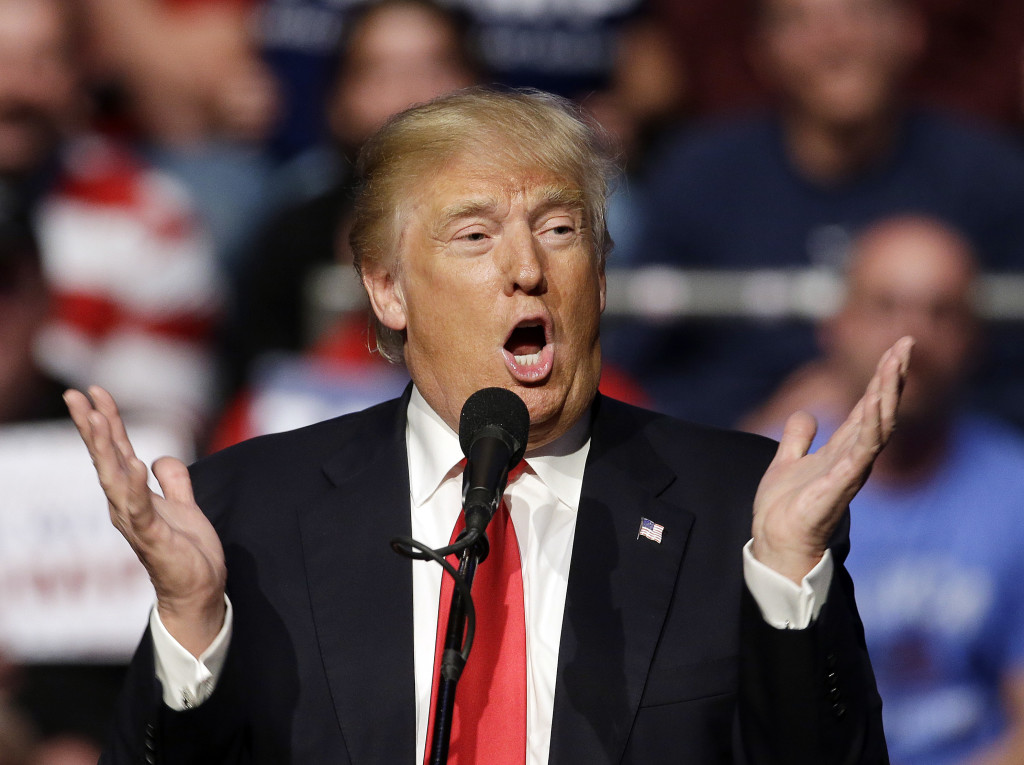
Donald Trump says he’s “not ready to support” House Speaker Paul Ryan‘s agenda after the country’s top elected GOP official said he’s not ready to back Trump as the party’s presidential nominee. In a statement released by his campaign, Trump says, “Perhaps in the future we can work together and come to an agreement about what is best for the American people.” Trump says Americans have been “been treated so badly for so long that it is about time for politicians to put them first!” Ryan said on CNN earlier Thursday that he’s “just not ready” to support Trump’s candidacy, even though the billionaire businessman is the presumptive GOP nominee. The statement from the popular Ryan is further evidence of how much resistance remains inside the party to Trump’s candidacy. Republished with permission of the Associated Press.
Darryl Paulson: Candidate’s running mate rarely affects outcome of presidential election
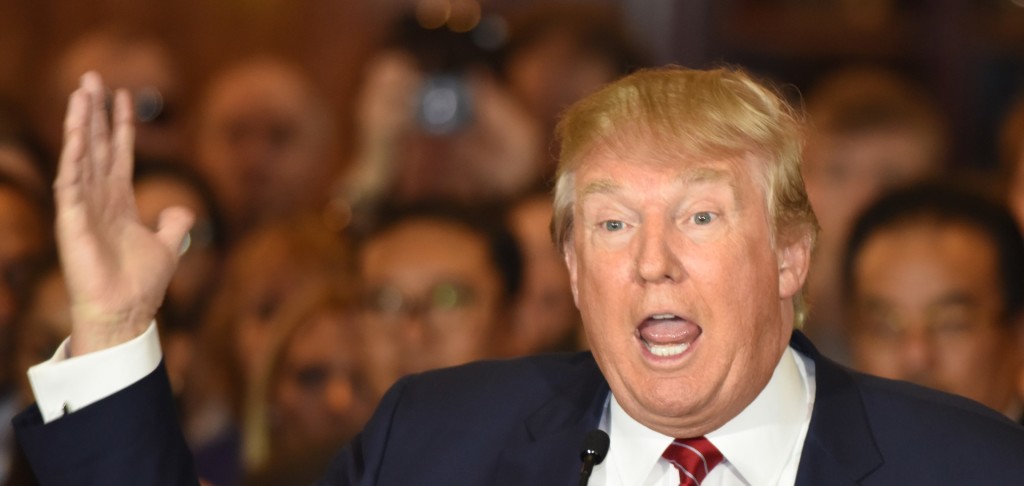
The national conventions are less than three months away and, as the nomination phase comes to a close, attention will gravitate toward potential vice presidential candidates. Let’s focus on the factors that have been used in selecting vice presidents. Most conventional wisdom is wrong. To begin with, most people and many presidential candidates select a vice president who they believe will help them win the election. Few vice presidents have had any effect on the election results. Jack Kemp did not help carry his home state for Bob Dole and Paul Ryan did not win Wisconsin for Mitt Romney. On the Democratic side, Sen. Lloyd Bentsen was not able to carry Texas for Michael Dukakis, nor did John Edwards help the Democrats win South Carolina or other southern states. One of the few times a vice president actually helped a president carry a state was in 1960 when John F. Kennedy picked Sen. Lyndon Johnson as his running mate. If Kennedy had not won Texas, Richard Nixon would have won the presidency. In like fashion, vice presidents are sometimes selected to provide regional balance, although there is no evidence that this helps. When Bill Clinton of Arkansas picked fellow southerner Al Gore as his vice president, many thought this unbalanced regional ticket was crazy. When the Clinton-Gore team captured the electoral vote of four southern states, something that Democrats had been unable to do in recent presidential elections, Clinton’s choice looked like genius. In addition to regional balance, vice presidents are sometimes selected to provide ideological balance. With increased polarization in recent years, this is becoming a less important factor. In 1976, Ronald Reagan announced Sen. Richard Schweiker of Pennsylvania as his vice presidential choice prior to the convention. Reagan hoped to alleviate the fears of some that he was too conservative and needed a moderate to balance the ticket. More importantly, Reagan hoped that picking Schweiker would convince some Pennsylvania delegates to support his candidacy over incumbent Gerald Ford. The pick of Schweiker did not help Reagan and Ford went on to win the nomination. Many Democrats in 2016 see Hillary Clinton as too conservative and too establishment and have urged her to choose a progressive as vice president. In addition to Bernie Sanders, other progressive names being floated are Sen. Sherrod Brown of Ohio and Sen. Elizabeth Warren of Massachusetts. A vice president is sometimes selected to stimulate participation by a particular group. Walter Mondale selected Geraldine Ferraro to get more women to vote. That pick didn’t provide much help. Mondale won only his home state of Minnesota and the District of Columbia against Reagan. Vice presidents have been picked to add gravitas to the ticket. Concerns about Reagan’s limited government experience led him to pick George Herbert Walker Bush as his vice president. Bush had been a member of Congress, the U.S. ambassador to the United Nations and to China, head of the Republican National Committee and head of the CIA prior to his selection. Bush’s son, George W., picked Dick Cheney as his vice president to add heft to his ticket. Cheney had served as Chief-of-Staff to Ford, been a member of the House, and served as Secretary of Defense for George W’s father. In fact, Cheney headed George W’s vice presidential selection team and concluded he was the best candidate. Do any of these factors help a presidential candidate win? The answer is no. A study by two political scientists, Bernard Grofman and Reuben Kline, analyzed 11 presidential elections between 1968 and 2008 and found the net effect of a vice president was 1 percent at most. If Clinton is the Democratic nominee, she may pick a progressive or choose someone like Secretary of Housing and Urban Development Julian Castro. Although not well known, Castro’s youth and Hispanic background might help stimulate Hispanic turnout. If Trump is the GOP nominee, it is easier to put together a list of people he would not select than those he would. There is little chance that “lying Ted,” “little Marco,” or “low energy Bush” would want to join forces with Trump. Gov. Scott Walker of Wisconsin is one possibility since he dropped out of the nomination race early before Trump had the opportunity to insult him. Chris Christie is another option because he was the first major candidate to endorse Trump after Christie withdrew. Another option is Florida Gov. Rick Scott. Florida is a “must win” state and Scott endorsed Trump as a “businessman outsider who will shake up the status quo in Washington.” Although most of the factors in the vice presidential selection process have been shown to have little impact, there are two general rules that no president should ignore. First, pick someone you feel comfortable working with. Second, and most important, pick someone who is ready to be president. Nothing else matters. *** Darryl Paulson is Professor Emeritus of Government at USF St. Petersburg.
Bradley Byrne: Signs continue to show Obamacare’s fatal flaws
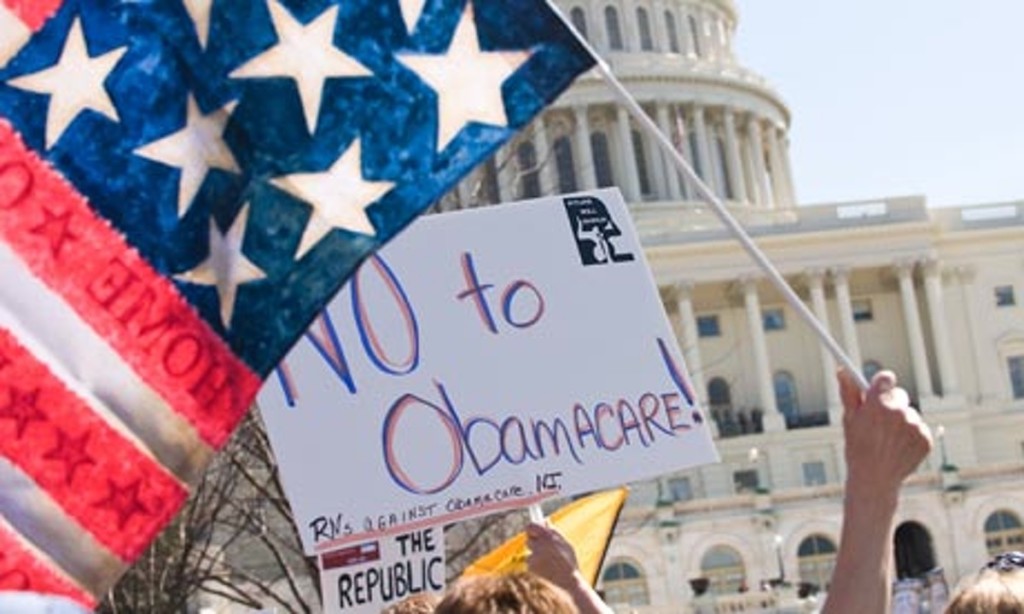
Last week, UnitedHealthcare, our nation’s largest health insurance provider, announced it would be pulling out of the federal Obamacare insurance marketplace and also backing out of most state health care exchanges. The UnitedHealthcare news is significant. In addition to being the largest health insurance provider in the country, they also offered some of Obamacare’s most affordable plans. An analysis by the Kaiser Family Foundation found that over 1 million enrollees will now be left with only one option. An additional 1.8 million enrollees will only have two insurance options to pick between. UnitedHealthcare is backing out because of major losses. In January, the company announced that it had accrued over $1 billion in losses during the past two years. In fact, the CEO of the company said even entering the Obamacare market was “a bad decision.” Unfortunately, most other major insurers are facing the same problems. Millions of people are gaming the Obamacare system, signing up for coverage only to cancel after receiving expensive treatments. Additionally, while the sick are signing up, many healthy people are choosing to pay the fine rather than obtain coverage. With UnitedHealthcare out of the market, basic economics tells us what will possibly happen next. Fewer choices for consumers mean less competition in the marketplace. Less competition means higher prices for consumers. Just as bad, a law that was supposed to help create more health care choices for the American people seems to be doing just the opposite. UnitedHealthcare’s decision was shocking, but sadly, not surprising. Since Obamacare was first passed in 2010, many people, including myself, have warned that the law was fatally flawed. UnitedHealth is the first to drop out, but they may not be the last. Although insurance companies can drop out of Obamacare’s exchanges, millions of Americans don’t have that option. Too many families in Southwest Alabama and all around the country have already seen Obamacare’s many flaws. They had their health care plan cancelled. They saw their deductibles rise. Many found it harder to see the doctor they wanted. Last year, I led the charge in the House of Representatives to repeal Obamacare in its entirety. I was pleased to see my bill pass the House on February 3, 2015 by a vote of 239 to 186. Sadly, the Senate has so far failed to act on my legislation. The reality remains that our best chance to repeal Obamacare and move forward with true, patient-centered health care reform will have to come from a new president. The Obama Administration has shown little willingness to even try and fix their broken law, much less actually move forward with a full repeal. Despite President Obama’s resistance, the House has already begun work on an alternative to the failed law. Speaker Paul Ryan has created a task force to focus on drafting our own health care law that puts patients first, gets government out of the way, and actually lowers health care costs for hardworking Americans. If we are going to move forward with a full repeal, we must have a clear alternative. Ultimately, Obamacare is fatally flawed and may continue to fall apart on its own. Regardless of what happens, we must continue to focus on real health care solutions that benefit each and every American family. • • • Bradley Byrne is a member of U.S. Congress representing Alabama’s 1st Congressional District.
GOPer: Rules change would prevent ‘dictatorial’ convention

A member of the Republican National Committee trying to revamp GOP rules for nominating a presidential candidate says without the change, party leaders could exert “almost dictatorial power” at this July’s nominating convention. The criticisms by Solomon Yue, RNC committeeman from Oregon, were the latest broadside in an internal GOP battle over the rules that will help decide the party’s standard-bearer for the White House. The comments, included in an email he sent Monday that was obtained by The Associated Press, come two days before party leaders gather in Hollywood, Florida, to discuss whether to propose changing bylaws for the convention. The fight pits Yue and some allies against GOP Chairman Reince Priebus and other top party officials. It underscores the high stakes as the convention in Cleveland, Ohio, looms as the first in four decades that may begin without a presumptive presidential candidate. The RNC said Monday that Priebus will oppose any effort to change the convention’s rules at this week’s Florida RNC meeting. The RNC can recommend convention bylaws, but only the convention’s 2,472 delegates can adopt them. Priebus believes “the rules of the convention should be decided by the delegates elected by Republican grassroots voters,” the RNC said in a statement. With Priebus and other top party officials arrayed against him, Yue could face an uphill battle. Henry Barbour, RNC committeeman from Mississippi, said he sees little support for “a change three months before what would be the first open convention in 40 years. Nobody wants to look like they’re trying to give an advantage to one candidate or another.” Yue wants the convention to use Roberts Rules of Order, which would let delegates block the convention’s presiding officer from allowing the nomination of fresh candidates for president. GOP conventions have long used House of Representatives’ rules, which give the presiding officer more unfettered power to run each day’s session. “I believe in democracy and majority rule of the delegates and am concerned that almost dictatorial power the House rules give the chairman of the convention will lead to confusion, chaos, manipulation and revolt at the convention,” said Yue’s email, which he sent his 55 colleagues on the RNC’s rules committee. Yue wrote that Oregon Republicans want him to “stop the D.C. establishment from parachuting in their favorite candidate as a ‘fresh face’ into the convention.” He said the party is in “a period of mistrust.” House Speaker Paul Ryan, R-Wis., is expected to be the convention’s presiding officer. He has said he wouldn’t accept the presidential nomination, but others have held out hope that he or another fresh candidate could emerge as the candidate. Many in the party want businessman Donald Trump and Texas Sen. Ted Cruz, the leading contenders, and Ohio Gov. John Kasich, who trails, to be allowed to battle it out without facing a new rival who’s not run for president this year. In an interview, Yue declined to predict whether he would prevail when the GOP’s rules committee considers his proposal this week. He said if his plan is rejected, he will push for its approval by the full RNC and then at the July convention, where he said he believes the delegates will look more favorably at it. “The anger is from outside the party, the grassroots,” Yue said. “They don’t want to see the chairman of the convention get absolute power.” Republished with permission of the Associated Press.
GOP official rails over effort aimed at nomination rules
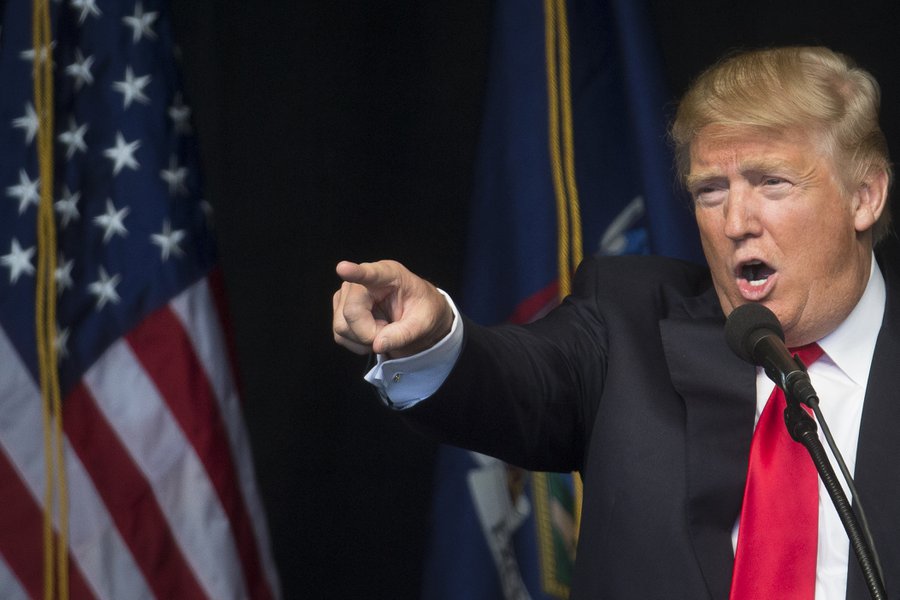
In an extraordinary display of internal discord, the chairman of the Republican Party’s rules committee accused top GOP officials Saturday of “a breach of our trust” by improperly trying to impede a proposed change in bylaws that would make it harder for party leaders to nominate a fresh candidate for president. Bruce Ash, RNC committeeman from Arizona, wrote the harshly worded email to the other 55 members of the GOP rules committee that he chairs. The confidential email, obtained by The Associated Press, was written days before party officials gather in Hollywood, Florida, for preliminary discussions about what rules the GOP will use at its presidential nominating convention this July. Ash wrote the note at a time when some top Republicans consider the party’s two leading presidential contenders, billionaire Donald Trump and Texas Sen. Ted Cruz, to be likely November election losers and have discussed how to replace them with alternatives at the summer convention in Cleveland, Ohio. It is possible that no contenders will have the 1,237 delegates needed to clinch the nomination at that gathering, which would produce the first GOP convention without a presumptive nominee since 1976. Trump has bitterly clashed with party leaders over rules that he claims have been rigged against him, a charge party leaders deny. Ash said he has “become troubled” during discussions with RNC Chairman Reince Priebus and other party officials that by not making the proposed change, GOP officials “could use their power to attempt to achieve a political result” at the nominating convention. He said the convention’s presiding officer could use existing rules to “unilaterally reopen nominations to allow a candidate to be nominated that is viewed as more acceptable, which is exactly what so many rank-and-file Republicans across America fear.” His email did not mention that House Speaker Paul Ryan, R-Wis., is expected to be presiding officer for much of the convention. Some opponents of Trump and Cruz have suggested that Ryan, his party’s 2012 vice presidential candidate, would be a preferable presidential nominee this year, but Ryan has said he doesn’t want to be tabbed. In an email sent hours later, RNC chief counsel John Ryder said the controversial amendment would, in fact, be included among the items given priority consideration when party officials discuss convention rules this week in Florida. But echoing the view of Priebus and some other Republicans on the party’s rules committee, Ryder added, “Major changes now are dangerous and not a good idea, in my humble opinion.” Many Republican leaders have said party officials should not change current convention rules for fear of being accused by the competing presidential candidates of tilting the bylaws to influence the outcome. They have noted that the final decisions on the rules will be made anyway by the convention’s 2,472 delegates, probably on July 18, the gathering’s first day. When Republicans meet in Florida next week to discuss their rules, Oregon RNC committeeman Solomon Yue wants to propose not running full convention meetings under the rules of the House of Representatives, a long tradition. Instead, Yue wants to use Roberts Rules of Order. Yue and others say under the Roberts rules, it would be easier for the convention’s delegates to vote to block an effort by the convention’s presiding officer to consider new nominees for president. Under House rules, the presiding officer has more power to make decisions about the proceedings. Ash said RNC officials have repeatedly asked him and Yue to withdraw Yue’s proposal or even to cancel this week’s GOP rules committee meeting. Ash said he refused. He said that last Thursday, Ryder “convened a rules committee whip call to strategize against and led the opposition to the Yue amendment at the chairman’s request.” He said during that call, RNC officials acknowledged that Yue’s amendment had been “pre-submitted” by a deadline that would give it priority treatment his week. But the next afternoon, Ash said, the RNC sent an email “incorrectly stating” that Yue’s proposed amendment had not been submitted in time to be included in the agenda for next week’s meeting. That would deprive it of priority consideration. “In view of the above, I consider this to be a breach of our trust,” Ash wrote. He added, “In light of this breach and an apparent unwillingness to conduct a proper debate on the amendment, is it prudent for the RNC to continue to give the extraordinary power of the House rules to the presiding officer of the convention, as opposed to the more transparent, democratic and majoritarian rules in Roberts?” Ryder wrote that party officials thought they were following Yue’s desire to circulate his amendment to delegates early next week, even though Yue submitted his proposal in time for the earlier “pre-submission deadline.” “Of course, we wouldn’t have left out Mr. Yue’s amendment from the notice if we thought he wanted it included,” Ryder wrote. Republished with permission of the Associated Press.
Local roundup: Confederate jacket sparks dispute, Paul Ryan to fundraise in B’ham, Mobile debates Gulf Coast gas tanks

It wasn’t long ago when Confederate iconography was generating statewide headlines amid a dispute between Gov. Robert Bentley, who supported downplaying the state’s secessionist history, and his critics who said he was “deceptively” revising Alabama’s history. This week, a rebel soldier’s jacket has stirred controversy of a different kind. A Huntsville collector, Joe Fitzgerald, who purchased an 1860s-era CSA jacket worn during the Civil War is now fighting for his right to keep the jacket, in the face of charges the relic was stolen from a New Orleans museum. Fitzgerald says the Confederate Memorial Hall Museum – who claims the jacket was lifted from them during the 1980s – has never proven the antique actually belong to its purported owner, Confederate Army Capt. William Lyman, and so cannot claim for certain the missing jacket is the same as the one he owns. Fitzgerald bought the coat in 2009 at a civil war history convention. Representatives of the aggrieved museum appraise its value at $75,000. The two parties are fighting out the dispute in Madison County Circuit Court. MARATHON MOBILE CITY COUNCIL MEETING SETS UP MOMENTOUS VOTE ON GAS TANK FARMS ALONG COAST After an hours-long public comment period at a Mobile City Council hearing on whether or not to enshrine petrochemical farming along the ecologically-sensitive Gulf Coast, the real work of regulating the operations is just getting started. Environmental activists and industry advocates sparred well through what normally would have been a lunchtime recess, trading barbs over economic development and the preservation of the port. Casi Callaway, executive director of Mobile Baykeeper, said she hoped to speak in favor of a compromise, but said a clause to exempt existing operations from the proposed regulations was a non-starter. Speakers like Mobile Chamber VP Troy Wayman said environmental concerns are exaggerated, even ginned up by billionaire environmentalists like George Soros. A vote could come as soon as this week, bout council members and council Attorney Jim Rossler indicated possible tweaks would push a final vote until at least April or longer. MONTGOMERY HAPPENINGS Montgomery cancelled municipal elections planned for May after no one ran to oppose a handful of incumbent officials during a March 8 meeting of the City Council. The Mayor’s office and Council seats 6 and 7 were all up for election, but no challengers emerged The cancellation means incumbent Mayor Kirk Jones and Council Members John Champagne Jr. and Rebecca Huss will remain safely on the council until 2018. • • • An officer with the Montgomery Police Department resigned on Tuesday after being arrested and charged with leaving the scene of a traffic accident while off-duty, a felony. 22-year-old G.T. Farris reportedly left a two-car accident involving him and another driver at 3 a.m. Tuesday morning. Farris was detained in a Montgomery County jail and held under a $15,000 bond. The department received and accepted his resignation after beginning the process of terminating him unilaterally. PAUL RYAN IN ALABAMA Speaker Paul Ryan will be in Birmingham on Wednesday to raise money to help grow the Republican majority in the House. U.S. Reps. Robert Aderholt and Mike Rogers will be on hand as Ryan stumps for campaign cash to benefit the National Republican Congressional Committee. TRUSSVILLE SUPERINTENDENT SAYS ‘NO THANKS’ TO PAY INCREASE Dr. Pattie Neill signed on for four more years as head of Trussville Schools, but said no to the customary raise that usually entails. Her reason? Under state law, teachers with more than 28 years of experience are capped on their salaries. Neill, a former teacher, says it wouldn’t be right to take a raise until the state of Alabama acts to lift that restriction. “I have more than 28 years of experience and I consider myself just like they are,” Neill said. “I think it’s important to honor those people who are still in the work, and the work is every day and it starts over every year and I think the state needs to be appreciative of that.” Under her just-renewed contract, Neill makes $176,000 annually. STATE HEALTH OFFICIALS: PARTS OF MOBILE BAY OK’D FOR OYSTER HARVESTING Officials with the Department of Public Health have given the green light for reopening two areas of the Mobile Bay for oyster harvesting, following possible bacterial contamination stemming from heavy rainfall in late February. Two parts of the Bay, including Heron Bay, are now deemed safe for oystermen and the public.
Wisconsin-based ‘Cheesehead Revolution’ challenged by Donald Trump

A trio of Wisconsin Republicans looking to inject the party with their own youthful, aggressive brand of conservatism ushered in the “Cheesehead Revolution.” Their aim was to position the GOP for success in the 2016 presidential election. Then came Donald Trump. With the anti-Trump movement in full swing even as Trump solidifies his front-runner status in the presidential race, the focus turns to the April 5 primary in the home state of those three heavyweights: House Speaker Paul Ryan, Republican National Committee Chairman Reince Priebus and Gov. Scott Walker. They are trying to chart a course in the face of a revolt over Trump’s rise and what it means for the future of the Republican Party — and for each of them individually. “The great plans came off the tracks with the presence of Donald Trump, both in terms of where the party would be and presidential ambitions,” said Democratic Milwaukee Mayor Tom Barrett, who ran against Walker twice and lost both times. “Donald Trump changed everything.” The “Cheesehead Revolution,” as Walker and Priebus dubbed it, began in 2011. With Ryan rising in the House, Walker a new governor, and Priebus taking over the party apparatus, the trio then represented what looked to be a unified party in a swing state that could become a GOP stronghold in presidential races to come. But in 2012, Mitt Romney lost to incumbent Barack Obama, with Ryan as his running mate. Priebus tried to steer the party in a more inclusive direction. In 2013, he issued the “Growth and Opportunity Project,” aimed toward an immigration overhaul and outreach to minorities, and driven by the recognition that Hispanics in particular were rising as a proportion of the population. Now that tract is known as an autopsy report. The recommendations put Priebus at odds with more conservative Republicans. And now, two of the three remaining presidential candidates, Trump and Texas Sen. Ted Cruz, have built their campaigns not on trying to broaden the party by reaching out to Hispanics and minorities, but by appealing to evangelicals and more conservative white voters. Priebus’s report “has been haunting the Republican Party” ever since its release, said Steve King, an Iowa Republican congressman who backs Cruz. “It’s awfully hard to recover from something like that,” King said. Trump launched his campaign by calling Mexican immigrants rapists and criminals. He’s made a border wall a cornerstone of his platform. Those positions have torn at the party’s core, contributing to efforts to stop him. Priebus puts the best face on the chaotic campaign. He says his party is large enough to handle a variety of opinions about the best course. He cites record fundraising and voter turnout. He calls it a “miracle turnaround.” Ryan became House speaker in October, replacing John Boehner, and his stock has risen to a point that some Republicans see him as an alternative to Trump if the nomination isn’t settled going into the summer convention. “Paul Ryan has brought about climate change there,” said King, meaning the climate in Congress, “and I mean that in a very complimentary way.” King is one of the most conservative members of Congress and was a critic of Boehner. Just as he refused initial calls to run for speaker, Ryan has tried to tamp down talk of being drafted as an alternative to Trump at the convention. Robin Vos, the Republican speaker of Wisconsin’s state Assembly, said Trump’s rise has helped to put the Republican Party at a crossroads. But Vos said he still believes Walker, Ryan and Priebus are in positions to “change the face of government.” Vos pointed to Walker’s record as governor as proof that with a “good, articulate leader,” Republicans can advance their conservative agenda, even in a politically divided state like Wisconsin. Vos endorsed Cruz on Friday. But Walker has been struggling with public support since his failed presidential run. His call in September for other Republican candidates to join him and drop out of the race to make it easier for others to take on Trump went ignored for months. Walker still hasn’t endorsed anyone in the race, with Wisconsin’s primary just over a week away. He told AP he sees Trump’s popularity as an “an anomaly” that is overshadowed in significance by Republican success in governor’s races and state legislative contests for years. “You look over the last five, six years, the story that’s had the longer impact is not who the nominee is for one presidential election but this shift that’s happened nationally,” Walker said. Barrett, the Milwaukee mayor who lost to Walker in 2010 and 2012, said the political landscape has changed for Walker and Republicans since the governor won a recall election four years ago over his battle with public-service unions in the states. “A lot of the glitter’s gone,” he said. Republished with permission of the Associated Press.
Paul Ryan slams ‘ugliness’ in politics amid Donald Trump-driven chaos
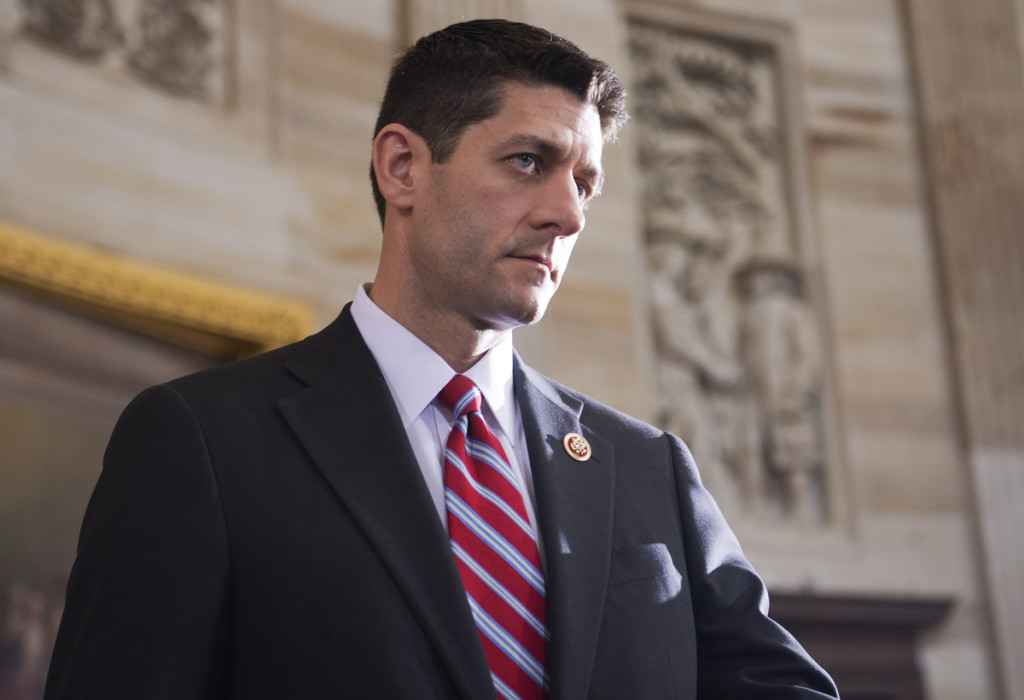
House Speaker Paul Ryan on Wednesday decried ugliness and divisiveness in American politics, delivering a veiled but passionate rebuke to GOP presidential front-runner Donald Trump and the nasty tone of the presidential campaign. “When passions flair, ugliness is sometimes inevitable. But we shouldn’t accept ugliness as the norm,” Ryan told an invited audience of congressional interns on Capitol Hill. “If someone has a bad idea, we tell them why our idea is better. We don’t insult them into agreeing with us,” he said. The Wisconsin Republican never mentioned Trump’s name or that of any other candidate, Republican or Democratic. But his targets were clear in a sometimes frightful campaign season that’s featured insults, sucker-punches and near-riots as often as substantive policy debates. “It did not used to be this bad, and it does not have to be this way,” Ryan said. “We are slipping into being a divisive country,” he said. “If we’re going to keep this beautiful American experiment going we’re going to have to stay unified.” Some of Ryan’s comments nearly echoed remarks last week from President Barack Obama, who voiced dismay at the violence and “vulgar and divisive rhetoric” of this presidential race, and issued a plea for civility. Still, Democrats wasted no time in criticizing Ryan’s remarks, noting that while remaining officially neutral in his party’s presidential primary, Ryan has repeatedly promised to back the eventual GOP nominee. The speaker has also avoided any outright denunciation of Trump even while criticizing several of the businessman’s more extreme positions, such as barring Muslims from entering the country. “Speaker Ryan’s words will ring hollow until he backs them up with action and withdraws his support from Donald Trump,” said Adam Jentleson, spokesman for Senate Minority Leader Harry Reid of Nevada. Ryan’s outwardly neutral stance comes even as other GOP leaders have openly searched for ways to prevent Trump from clinching the nomination before or during the party’s July convention in Cleveland. Ryan, his party’s 2012 vice presidential nominee, has said he is not interested in becoming president and has dismissed growing talk of a contested convention that could turn into a free-for-all for the nomination. Yet Ryan similarly claimed he never wanted to become speaker. He ended up with the job anyway after John Boehner, R-Ohio, was pushed out by conservatives last fall and a leadership vacuum resulted. Ryan delivered his remarks Wednesday in the lofty hearing room of the Ways and Means Committee, which he previously chaired. The speech came on the final day of congressional work ahead of a two-week spring recess. Republished with permission of the Associated Press.
Jac VerSteeg: Political fratricide model fails Marco Rubio
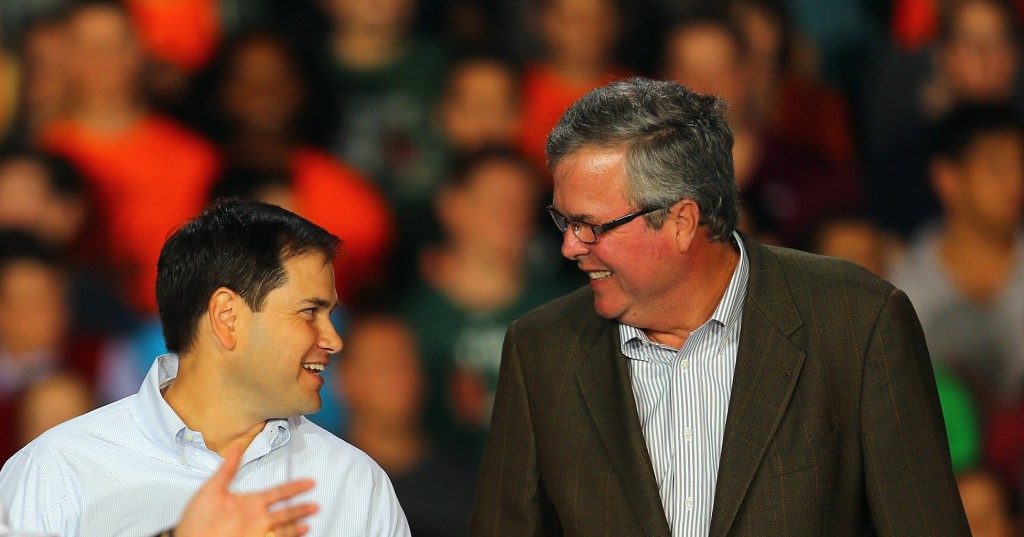
Marco Rubio was convinced the Fratricide Model of politics was his ticket to the top. Now, after one brilliant win and one spectacular loss, the Florida senator claims to have renounced the model. He will not, he says, run for governor in 2018. Florida Agriculture Commissioner Adam Putnam need not fear a Rubio challenge. We won’t have Marco Rubio to kick around anymore? Political fratricide worked for Rubio in 2010 when he broke in line to oppose and defeat Gov. Charlie Crist for a U.S. Senate seat. He was helped along by that year’s Tea Party revolt and the fact that newly Independent Crist and Democrat Kendrick Meek split the no-to-Rubio vote. Just as angry as the 2010 Tea Party faithful but with a new idol, Florida GOP primary voters this month delivered the final blow to Rubio’s second attempt at exploiting the Fratricide Model. They gave Donald Trump a victory in every county except Rubio’s Miami-Dade refuge. What effect did Rubio’s fratricidal challenge to his mentor (and his better) Jeb Bush have on the contest? What if Rubio had shown respect, bided his time and supported Bush? No way to know, but Florida might have been the firewall for Bush and the anti-Trumpers that it so dismally failed to be for Rubio. I do not think that every intra-party challenge can be characterized as an example of the Fratricide Model. It’s appropriate for rivals in the same party to let voters decide between them. But when one of the challengers has not earned the right to vie for an office and, further, damages the party or the office he seeks, that is political fratricide. And that is what Rubio has done. He knocked off Crist – once a Republican rising star – and proceeded to disdain the Senate seat he won. As a result, the seat easily could go to a Democrat this November. Then, of course, Rubio challenged Jeb. After helping to undermine the clear choice of the GOP establishment, Rubio proceeded to run a horrible campaign. The overall effect boosted Trump’s prospects and hurt the Republican Party. What will Rubio do next? He claimed, upon returning to work in the Senate – if someone so often a no-show can be said to “return to work” – that, in addition to eschewing a gubernatorial bid, he would not be anybody’s veep. You never know what to make of a politician’s claim that he won’t seek this or that office. How many times did now-House Speaker Paul Ryan claim that he would not accept the post? (By the way, Ryan also insists he won’t allow himself to be nominated at a fractured GOP convention this summer. Right.) For Rubio, who has been assailed for overweening ambition, what better strategy than to affect a new humility and express no ambition whatsoever for political office? Is it really believable that if, by some miracle, he emerges as a vice presidential candidate – perhaps for Ryan at a brokered convention – Rubio would turn down the chance? It is more believable that Rubio does not plan to run for governor in 2018. Not because he doesn’t lust after political office, but because he was so badly burned this year by the Fratricide Model. Even Rubio should be able to see that he is less qualified and less deserving than the premier GOP candidate for the job, Putnam. Putnam served in the Florida Legislature and then went on to serve in Congress for 10 years. Unlike Rubio, Putnam actually performed his job diligently and rose to be the third-highest ranking Republican in the U.S. House. Then, rather than stay in a secure seat in federal office, Putnam chose to return to state politics and has been elected and re-elected as Ag commissioner. It is worth emphasizing that Putnam’s chosen trajectory brought him voluntarily back to Florida. Rubio’s chosen path was to attempt to move into the White House. Only a failure to reach that goal could bring him the “consolation prize” of a gubernatorial campaign. And even if he were elected governor, he would just treat it as a stepping stone back onto the national stage. Could Rubio beat Putnam? Considering his drubbing on the Ides of March, the likely answer is no. His decision not to run for governor easily could be a case of sour grapes rather than an example of his newfound humility. Since Rubio decided to give up his Senate seat, it is hard to see any political path that puts him back on that stage. His best option? Hope that anybody but Trump wins and that Rubio could find a spot in a Ted Cruz or John Kasich administration and bide his time. But does anyone think that if Rubio saw a chance to return to political prominence he would hesitate to seize it even if it meant running over one of his Republican brethren? Oh, brother. *** Jac Wilder VerSteeg is a columnist for The South Florida Sun Sentinel, former deputy editorial page editor for The Palm Beach Post and former editor of Context Florida.
Ben Pollara: A Democrat’s unsolicited advice for the GOP that created Donald Trump
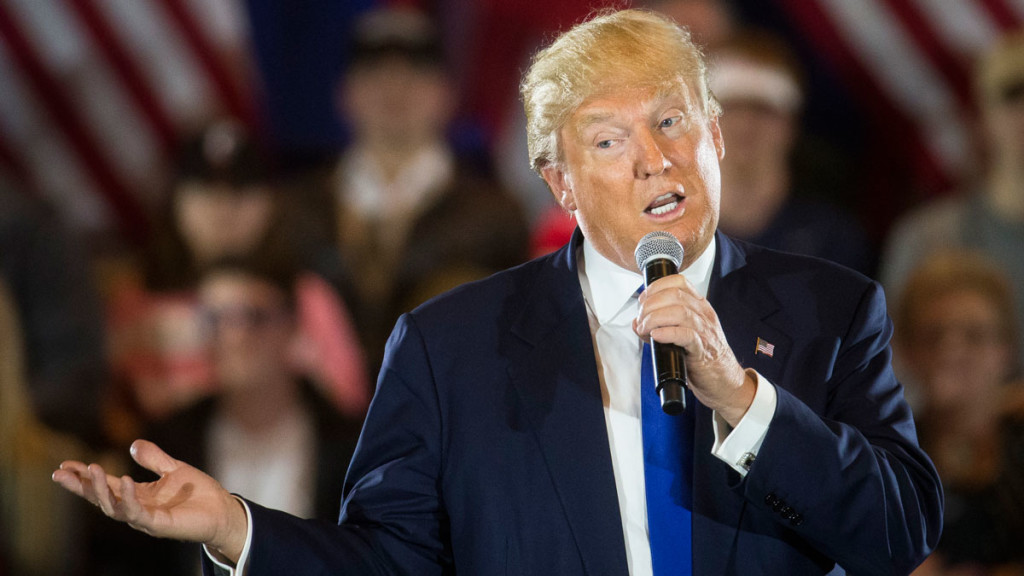
What is more appealing for Democrats like me? Donald Trump as the Republican nominee, or a fractured convention that produces a nominee who received no Republican primary votes, like Paul Ryan? Honestly, both sound pretty good and likely to culminate in a Hillary Clinton presidency. But it’s not up to Democrats like me, and the questions Republicans should be asking themselves have more serious consequences for both their party and our system of governance. Beyond my partisanship, I hold a core belief in the essential function of the two-party system and the imperfect, yet better than the alternatives, manner in which it maintains the values of our republican democracy. Assuming Trump enters Cleveland with a plurality but not majority of delegates, to deny him the nomination would shatter the Republican Party for a decade to come, and with it the two-party system that balances the most extreme tendencies of American political ideology. The media reacted with shock at Trump’s assertion that a brokered convention that denied him the nomination would lead to rioting. Trump has said many outrageous things, many of them without basis in fact. This was not one of them. Just as Vietnam and Civil Rights nearly tore apart the Democratic Party in 1968, denying Trump the nomination through Byzantine delegate rules would succeed in doing the same to the Grand Old Party. The party of Lincoln must come to terms with the reality that it now holds that moniker by historical fact only. The Republican Party has, by virtue of a political strategy to build a winning national coalition post-New Deal, become the party of Richard Nixon, Ronald Reagan, and yes, Donald Trump. To survive, Republicans must face down that which they have wrought through two generations of “dog whistle” racism and us-vs-them fearmongering that, until recently, served the cynical corporatists and political elites in the party quite well. The Southern Strategy and the rise of fundamentalist religious extremism paved the way for the K Street Project and 20 of 28 years of Republican White House occupancy; the Tea Party and Birtherism gave rise to the Koch-era and hegemony of the legislative branch in D.C. and most state capitols. But the craven decisions that led to these triumphs are causing the Republican Party to collapse under the weight of its own base. What fueled government shutdowns over previously benign issues like raising the debt ceiling and funding Planned Parenthood (and the ultimate ouster of John Boehner as Speaker of the House) is precisely what is fueling Donald Trump’s success. It is willful ignorance and intellectual dishonesty of the first degree for Republicans to bemoan the “Make American Great Again” movement and its accompanying rhetoric of angry xenophobia without owning responsibility for creating the environment that spawned it. You reap what you sow. Give Trump the nomination he has earned; you fostered the environment that incubated him. Let Trump fail spectacularly in November. Then look in the mirror and begin to rebuild the Republican Party in the image of Abraham Lincoln, rather than David Duke and his ilk. The alternative is a splintering of the very foundation of our political system and a generation of Democratic hegemony, which may have pundits in the not distant future bemoaning that “Barack Obama wouldn’t have been able to win a single state’s primary in today’s Democratic Party. He was basically a Republican.” Republicans should ask themselves, what is scarier? Four more years of a Democrat in the White House, or a future where that statement is true? • • • Ben Pollara is a political consultant and a founding partner of LSN Partners, a Miami Beach-based government and public affairs firm. He runs United for Care, the Florida medical marijuana campaign and is a self-described “hyper-partisan” Democrat.
Tea Party conservatives block Congressional budget; Paul Ryan cites anxiety among voters
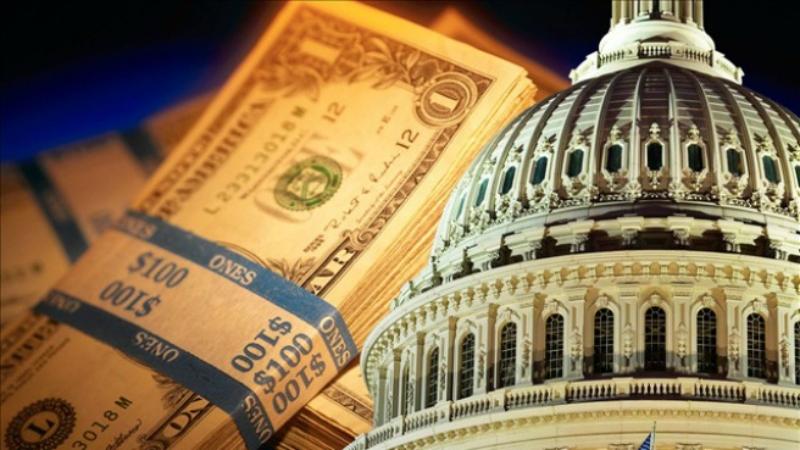
Tea party conservatives have blocked a budget plan backed by GOP leaders, a blow to House Speaker Paul Ryan and a reflection of the anti-Washington mood pushed by GOP front-runner Donald Trump. The move by the House Freedom Caucus, the same band of conservatives that toppled his predecessor, would mean that the House would fail to pass a budget for the first time since Republicans reclaimed control of the chamber in 2011. Ryan cited “all of the anxiety that’s coming to a crescendo in this country” for the reluctance of conservatives to endorse the leadership-backed budget plan. “We’re the body of government that’s closest to the people. We’re up for election every other year,” said Ryan, R-Wis. “And there’s just a lot of anxiety that’s out there.” The Freedom Caucus announced Monday night that it won’t support the budget measure, which was released Tuesday by Budget Committee Chairman Tom Price. The move by the bloc of 40 or so conservatives leaves the GOP budget well short of the votes required to pass it and reflects enduring opposition from tea party lawmakers over higher spending levels permitted by last year’s bipartisan budget and debt deal. Price is nonetheless pressing ahead with a panel vote Wednesday on the 10-year measure, which relies on huge spending cuts – $6.5 trillion over the coming decade – to demonstrate that the budget can be balanced. “Surrendering to the status quo or failing to act boldly will mean Americans today and in the future will have less opportunity and less security,” Price said in a statement. “It is a plan to balance the budget through commonsense reforms and greater economic growth; to create a healthier economy, more secure nation, and a more accountable Washington.” But as in past years, GOP leaders have no plans to implement the severe cuts recommended by nonbinding blueprint. Instead, the main goal of the budget moves is to set in motion the annual appropriations process, in which the 12 spending bills that set agency operating budgets are produced. That’s the $1.1 trillion “discretionary” portion of the $4 trillion-plus federal budget that is passed by Congress each year. Conservatives are sharply opposed to last year’s budget deal, which provided an additional $46 billion or so for higher budgets this year for the Pentagon and domestic agencies, easing cuts opposed by both GOP defense hawks and Democrats, who demanded more money for domestic programs. GOP-led committees are moving ahead with a more modest series of spending cuts. Republished with permission of the Associated Press.


